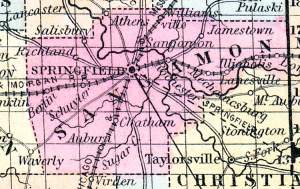Record Data
Source citation
To Oliver P. Hall, Jacob N. Fullinwider, and William F. Correll , February 14, 1860, in Roy P. Basler, ed., The Collected Works of Abraham Lincoln (8 vols., New Brunswick, NJ: Rutgers University Press, 1953), 3: 519-520, http://quod.lib.umich.edu/l/lincoln/.
Recipient (to)
Oliver P. Hall
Jacob N. Fillinwider
William F. Correll
Type
Letter
Date Certainty
Exact
Transcriber
Transcribed by the Lincoln Studies Center, Knox College, Galesburg, IL
Adapted by John Osborne, Dickinson College
Transcription date
Transcription
The following transcript has been adapted from the Abraham Lincoln Papers at the Library of Congress.
Messrs. O. P. Hall
J. R. Fullinwider & W. F. Correll.
Springfield, Feb. 14. 1860
Gentlemen. Your letter, in which among other things, you ask ``what I meant when I said this Union could not stand half slave and half free---and also what I meant when I said a house divided against itself could not stand'' is received, and I very cheerfully answer it as plainly as I may be able. You misquote, to some material extent, what I did say; which induces me to think you have not, very carefully read the speech in which the expressions occur which to [sic] puzzle you to understand. For this reason and because the language I used is as plain as I can make it, I now quote at length the whole paragraph in which the expressions which puzzle you occur. It is as follows: ``We are now far into the fifth year since a policy was initiated with the avowed object, and confident promise of putting an end to slavery agitation. Under the operation of that policy that agitation has not only not ceased but constantly augmented. I believe it will not cease until a crisis shall have been reached, and passed. A house divided against itself can not stand. I believe this government can not endure permanently, half slave, and half free. I do not expect the Union to be dissolved; I do not expect the house to fall; but I do expect it will cease to be divided. It will become all one thing, or all the other. Either the opponents of slavery will arrest the further spread of it, and place it where the public mind shall rest in the belief that it is in course of ultimate extinction; or it's advocates will push it forward till it will become alike lawful in all the states, old as well as new, North, as well as South.''
That is the whole paragraph; and it puzzles me to make my meaning plainer. Look over it carefully, and conclude I meant all I said and did not mean anything I did not say, and you will have my meaning. Douglas attacked me upon this, saying it was a declaration of war between the slave and the free states. You will perceive I said no such thing, and I assure you I thought of no such thing.
If I had said ``I believe this government can not last always, half slave and half free' would you understand it any better than you do? ``Endure permanently'' and ``last always'' have exactly the same meaning.
If you, or any of you, will state to me some meaning which you suppose I had, I can, and will instantly tell you whether that was my meaning.
Yours very truly A. LINCOLN



